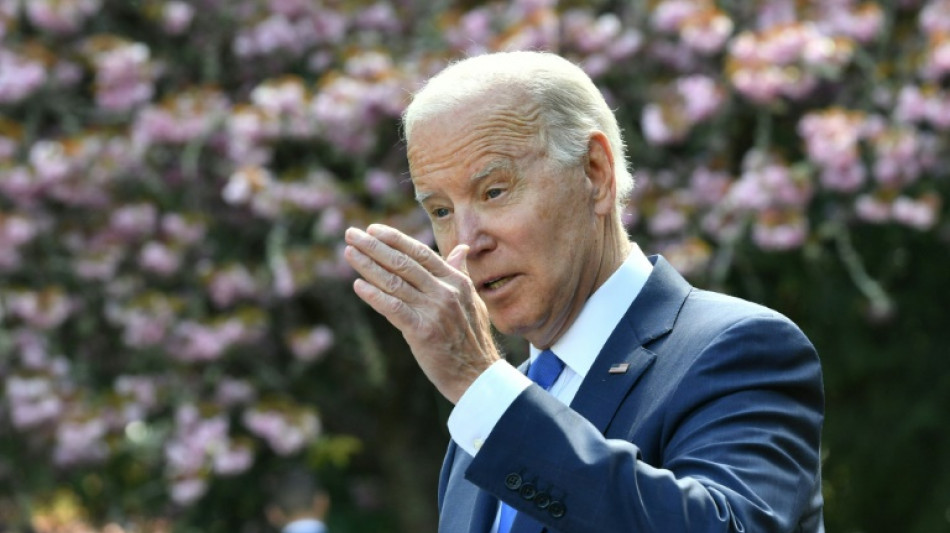

Biden protects US forests but struggles on biggest climate goals
President Joe Biden marked Earth Day on Friday by ordering protections for ancient forests and pondering a future without his beloved gas-guzzling Corvette sports car, but after 14 months in office his more ambitious climate goals look elusive.
The Democrat has campaigned heavily for environmental protections and US leadership in the response to global warming, but regularly run up against lack of support in Congress.
His executive order, signed in a Seattle park filled with tall trees and spring blossoms, recognized the importance of America's old-growth forests in mitigating climate change -- but also their vulnerability in an era of ever more intense wildfires across the western states.
In the order, Biden required officials overseeing federal lands to inventory all mature forests within a year and to identify threats to the trees so that they can be guarded, especially from fires.
"We have to move quickly and with this executive order on Earth Day we're also showing this moment of maximum threat and urgency can also be a moment of enormous hope," Biden said.
Recalling that much of the primeval forest covering the United States had long been cut down, Biden suggested that Washington underwrite the survival of Brazil's Amazon rainforest -- a vast expanse considered vital to regulating global climate, but under ever more aggressive assault from miners, loggers and farmers.
"We should be paying the Brazilians not to cut down their forest," he said.
"You know, our forests are our planet’s lungs. They literally are recycling and cycling the CO2 out of the atmosphere."
According to the White House, US forests absorb carbon dioxide equivalent to more than 10 percent of US annual greenhouse gas emissions, making mature and old-growth woodlands located on federal lands "critical carbon sinks."
- Electric or fossil fuels? -
Throughout his presidency, Biden has set ambitious environmental goals, starting by quickly reversing his Republican predecessor Donald Trump's move to pull the United States from the Paris climate accords.
However, with a barely functional majority in Congress, Biden has seen major policy initiatives on the environment fail to get off the ground.
Many of Biden's biggest pushes have come through executive orders, which do not require congressional approval, but can be countermanded by the next president.
On Tuesday, the Biden administration said it was restoring safeguards weakened by Trump, including a requirement for assessing climate impacts from infrastructure projects.
This will play a key role in the wave of public works set to unroll across the country under the White House's successfully passed $1 trillion infrastructure spending bill.
The bill, aiming to refurbish the country's tattered transport systems and other critical infrastructure, also includes billions of dollars to expand public transport, such as rail. Money is also set aside to promote solar panels and electric vehicle charging networks.
However, a second spending plan, which included a whopping $555 billion for clean energy development, failed in the Senate.
That setback cast a deep shadow over the administration's loftiest goals of all -- cutting US emissions to net zero by 2050 and powering the electric grid entirely with renewable energy by 2035.
And in addition to near complete opposition to his plans from Congressional Republicans, as well as wavering from several members of his own party, Biden faces the political realities of inflation, exacerbated by Russia's Ukraine war.
Western sanctions punishing energy producer Russia for its invasion of Ukraine have helped turn gasoline costs into a major political liability for Democrats in November's midterm congressional elections.
Biden has risked angering environmental activists by seeking to free up fuel supplies, with a million barrels of oil a day released from the Strategic Petroleum Reserve for six months, lifting a restriction on ethanol-based petrol, and reopening federal lands for oil and gas drilling.
In leafy Seattle, Biden took the long view, saying that progress away from fossil fuels is unstoppable.
"Last year, with all the disappointments we faced, the United States deployed the most solar, wind and battery storage in American history and we made record-setting investments in clean energy in rural America." he said.
Measuring that shift by another, more personal metric, Biden acknowledged he was a car buff and that his 1968 Corvette "does nothing but pollute the air."
He joked it was "disappointing" to discover that Ford's new all-electric pickup truck goes faster than his old muscle car, but added: "I did suggest that if I'm out of office and they had the first electric Corvette I'd want to buy it."
C.P.Wilson--RTC



